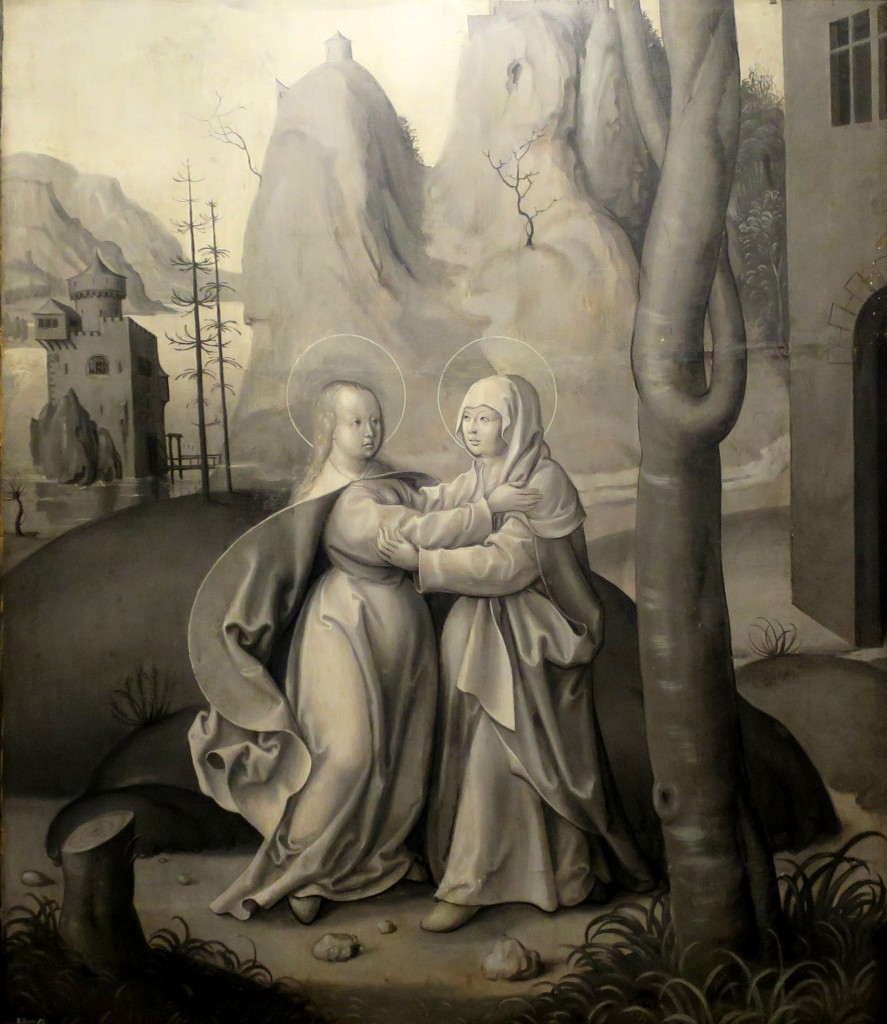The scripture readings for the season of advent tend towards the apocalyptic. I use the word in both senses here: in its original and etymological meaning of “revelation” (literally, unveiling) and in its more colloquial “end of the word” sense. Prophets arise, calling people to repentance. Kingdoms are laid waste and despoiled, but a new kingdom is foretold. And judgment is coming.
A voice cries: “In the wilderness prepare the way of the LORD, make straight in the desert a highway for our God.
Every valley shall be lifted up, and every mountain and hill be made low; the uneven ground shall become level, and the rough places a plain. (Isaiah 40)
There shall come forth a shoot from the stump of Jesse, and a branch shall grow out of his roots.
And the Spirit of the LORD shall rest upon him, the spirit of wisdom and understanding, the spirit of counsel and might, the spirit of knowledge and the fear of the LORD.
And his delight shall be in the fear of the LORD. He shall not judge by what his eyes see, or decide by what his ears hear;
but with righteousness he shall judge the poor, and decide with equity for the meek of the earth; and he shall smite the earth with the rod of his mouth, and with the breath of his lips he shall slay the wicked.
Righteousness shall be the girdle of his waist, and faithfulness the girdle of his loins.
The wolf shall dwell with the lamb, and the leopard shall lie down with the kid, and the calf and the lion and the fatling together, and a little child shall lead them.
The cow and the bear shall feed; their young shall lie down together; and the lion shall eat straw like the ox.
The sucking child shall play over the hole of the asp, and the weaned child shall put his hand on the adder’s den.
They shall not hurt or destroy in all my holy mountain; for the earth shall be full of the knowledge of the LORD as the waters cover the sea.
In that day the root of Jesse shall stand as an ensign to the peoples; him shall the nations seek, and his dwellings shall be glorious. (Isaiah 11)
At the time of the birth of Jesus, the Hebrew people could only look back upon their earthly kingdom as a remote memory, a time before captivity and exile, before their own kingdom was laid waste. The the colonized victims of a vast imperial power, under rulers who proclaimed themselves gods, the Jews of Palestine looked to the writings of the prophets as assurance that a deliverer would come who would restore Israel to her former glory, and restore justice to the people. Poor, downtrodden, denied the rights of citizens, brutally policed, the people longed for the coming of a Messiah who would lift up the lowly and smite their oppressors. This is evident in the Song of Mary, or Magnificat, in which a poor, pregnant young peasant girl dares to lift up her voice to a God of justice greater than Caesar.
Christianity tends to view history as linear, a single ongoing story leading up to a final apocalyptic point, but the reality is that our story of history is cyclical, repeating tropes and patterns and rituals. This is mirrored in the cycles of our liturgical year, which are closer to nature than the imposed idea of a single line of destiny from Genesis to Apocalypse. So when we celebrate Advent we look back at the words of the prophets who proclaimed the coming of the Messiah – but also forward, to the second coming of Jesus. He said he was coming back, after all.
And since then we have looked for him in the clouds, looked for him in signs and wonders, in rumor of war and upheaval. Whole cults have been formed around the idea of waiting for this elusive second coming, turning away from the things of the world and the cycles of the earth, towards some supposed explosion of it all. Waiting for Jesus has become an occupation for those unwilling to do the work of living on earth, a refuge for quacks and conspiracy theorists. It has even become a death cult.
I think we’ve been missing the point.
When, Christians ask, will Jesus come back? Perhaps he already has and is here among us. He told us where we would find him, after all:
“When the Son of Man comes in his glory, and all the angels with him, he will sit on his glorious throne. All the nations will be gathered before him, and he will separate the people one from another as a shepherd separates the sheep from the goats. He will put the sheep on his right and the goats on his left.
“Then the King will say to those on his right, ‘Come, you who are blessed by my Father; take your inheritance, the kingdom prepared for you since the creation of the world. For I was hungry and you gave me something to eat, I was thirsty and you gave me something to drink, I was a stranger and you invited me in, I needed clothes and you clothed me, I was sick and you looked after me, I was in prison and you came to visit me.’
“Then the righteous will answer him, ‘Lord, when did we see you hungry and feed you, or thirsty and give you something to drink? When did we see you a stranger and invite you in, or needing clothes and clothe you? When did we see you sick or in prison and go to visit you?’
“The King will reply, ‘Truly I tell you, whatever you did for one of the least of these brothers and sisters of mine, you did for me.’
“Then he will say to those on his left, ‘Depart from me, you who are cursed, into the eternal fire prepared for the devil and his angels. For I was hungry and you gave me nothing to eat, I was thirsty and you gave me nothing to drink, I was a stranger and you did not invite me in, I needed clothes and you did not clothe me, I was sick and in prison and you did not look after me.’
“They also will answer, ‘Lord, when did we see you hungry or thirsty or a stranger or needing clothes or sick or in prison, and did not help you?’
“He will reply, ‘Truly I tell you, whatever you did not do for one of the least of these, you did not do for me.’
“Then they will go away to eternal punishment, but the righteous to eternal life.” (Matthew 25)
At a time of year when Christians prepare to celebrate the coming of God into the world in the form of a vulnerable child, when we are lighting our advent candles and singing “O Come Emmanuel” – we would do well to recall that Jesus told us very clearly where we would meet him, again and again, in this life, on this earth. He is here already. He is among us, in the homeless man, in the sex-worker, in the addict. He is here in the hungry child dependent on food stamps. Will you vote to deny them? Jesus is in the refugee family at our borders. Will demand that they be sent away, or even imprisoned?
I have been co-leading an Advent writing workshop with writer Jessica Mesman, and we recently had an in class discussion about Flannery O’Connor’s short story “A Good Man is Hard to Find.” It’s one of those stories which, if one is Catholic, one gets with all the pious footnotes attached. Grace comes violently, unexpectedly – we know that. Sometimes you need a gun to your head to be a good person – we know that, too. When the Grandmother says to the Misfit “you’re one of my children” – it’s a moment of communion. I can recite all that in my sleep.
What came up in the class, this time, though, was a little different. One of the writers in the group, who happens to be Jewish, pointed out that when the Grandmother claims the Misfit as one of her own, she is taking responsibility for the evil that he has done, the evil in him and in the world.
I noted how this is reminiscent of the passage in A Christmas Carol, when the Ghost of Christmas Present shows Scrooge two miserable and starving children. Their names are Ignorance and Want.
When Scrooge, horrified, asks “whose are they?” the Ghost answers: they are yours.
The misfits and outcasts are “ours” not necessarily so we can all hold hands and hug and put the past behind us; that they are “ours” is a kind of condemnation. Their suffering is our responsibility. And the suffering they inflict? Also our responsibility.
These advent readings about justice and judgment – should we read them with hope, or with fear? It’s clear that for the downtrodden, the poor, the outcast, the exile, these readings speak of the coming of a savior who is for them.
But what about us? The powerful, rich, and prosperous? What about this nation that wages war and cages children? What about these churches where we pretend it isn’t happening – or, in some cases, even support it?
For us, the messages of apocalypse are messages of terror.
image credit: Mary_Visits_Elizabeth_unknown_German_artist_Bergen_Kunstmuseum.jpg













